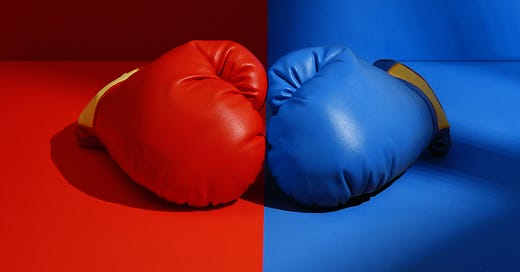Nine in ten Americans can name either a recent news event or something about American politics that made them angry…and…when asked how angry, 46% said “extremely angry.” What’s more, 55% of Americans said they had felt stressed out the day before they were asked, which may mean half of us feel stressed out every day. Two men, David Blankenhorn of New York City and David Lapp of Ohio, became keenly aware of this feeling and its opposite on November 9, 2016, the day after the presidential election.
After the 2016 election there were violent riots in Portland as well as massive protests in DC, New York, San Francisco, and other places—and a mob assaulted the Capitol after the 2020 election. The anger does not appear to have diminished.
It was the 2016 election that first prompted Blankenhorn and Lapp to gather two groups of people, half leaning Red (conservatives) and half leaning Blue (liberals) to see if you they could get them to talk with each other instead of at each other. Reds were celebrating, Blues were blue, and it became obvious to them that people looked at each other with anger, even within families. Over time, this led to a national organization, Braver Angels, to repeat these meetings.
I attended one of these meetings in Falls Church, Virgina. It lasted 6 ½ hours but it went by very quickly. We learned, and practiced, how to ask a question from the other side where the question was neutral, not accusing, or with an assumption. For example, you might ask, “Given that this is a racist country, what will your side agree to do about it?” That started with an assumption, that this is a racist country. Alternatively, you might start with an accusation, “Most of the mass shooter nuts are also right-wing zealots. Do you still think that people should be allowed to own guns?”
Obviously, both questions would put people on the defensive and no real communication would follow. The first exercise we did was to get all of the reds and blues separated into two rooms. Each group came up with lists of stereotypes they thought the other side had about them, e.g., Reds were against science, uneducated, pro-business, didn’t care about the poor and the Blues were soft on crime, pro-socialism and fiscally irresponsible. These questions and others were asked of each group, and they explained how these generalizations were wrong, although, in every case, each admitted some element of truth to them.
People were respectful, interested, and interesting. We talked about how each group shared what they thought were the big problems in the country and what they would do about it. This was probably the most interesting part of the entire day. There was a broad agreement about problems like crime, immigration, debt, and global climate change, but where it really got interesting was the solutions each side had. In many cases, we all heard solutions we had never thought of before. What was great was that, as the old saying goes, we all realized that there are different paths that lead to the same goal. And, at least as far as I could tell, no one was really wedded to their particular solution.
How about the problem that we started with, the anger and the animosity. I think Braver Angels is certainly one solution—and an additional one I heard from the group was going back to, or improving where it still exists, civics classes in school.
Braver Angels may help us to stop getting angry, particularly at the loudest, most extreme voices. It may help to know that some people get actual pleasure out of making people angry—why give them the satisfaction. Anger has been linked to insomnia, depression, strokes, and heart attacks.
If you are able to change your own reactions, not change your mind necessarily, you might want to engage with organizations like Braver Angels. If you don’t have the time, trying reading I Never Thought of It That Way by Monica Guzman. It won’t necessarily make you “Love thy neighbor as thyself,” but it might lead to a better understanding, less anger, and better health.





